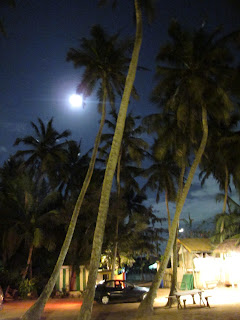 |
| Our hut |
After arriving at Big Milly's, Joey and I were escorted to our room hut. Now I should say this hut only cost of 34 Ghanaian cedis a night. That is the equivalent of $25. So for value for the money, we certainly got more than for which we paid. Our little hut consisted of two single, vinyl mattresses covered by a flat sheet, each framed on all four sides by two inches of wood, pushed together under a mosquito net built for one. The ceiling fan hung under the light fixture which created a lovely strobe effect when both were on at the same time. Also by the grace of God, I had not peed my pants (actually since I was wearing a skirt that would have been an even bigger mess) on the long, bumpy and terrifying journey from Accra. I scanned our hut for the private bathroom I requested.
 |
| Bathroom |
The hut only had two doors, so I opened the only other door which, indeed, led to our bathroom. Which consisted of a toilet. And a shower head. Under a banana tree. Under the stars. It did have four walls, but it was conspicuously missing a sink and a light, and oh, a roof. I sat and prayed that nothing would slither down from the banana tree while I quickly attended to my business. Then I found the bar of soap in the hut and held the rest of my body as far away from the cold shower in which I washed my hands. This certainly was going to be an adventure.
Joey and I decided that even though it was past midnight and we were both physically and emotionally exhausted, a night cap was in order. Cold drinks in hand, we climbed the stairs to the beach overlook under the moonlight and listened to the ocean.
Friday morning we slept in as late as the morning heat allowed. Once our hut started baking we donned our swimsuits and headed down the palm tree-lined path for breakfast. A thatched roof shielded the picnic tables from the sun; the open-air restaurant provided the perfect spot from which to observe the activity along the shore. While we enjoyed a scrumptious vegetable omelet and some truly amazing fresh-baked bread, we watched the fisherman untangle their webs of nets and marveled at the rickety, wooden boats bouncing in the waves.
 |
| View from breakfast |
After breakfast we deposited everything in our hut to walk along the beach. In addition to the brightly colored sign painted on the tall concrete wall around Big Milly’s Backyard, I’d read on many different websites that while the beach was generally safe, robbery was not uncommon, and I wasn’t willing to risk my good camera beyond the confines of Big Milly’s property. So empty-handed we turned left down the beach and into a different world.
Every few yards a line of workers pulled a thick rope to hold a bobbing boat full of muscular men and fish, while women adorned in brightly colored African fabrics carried away huge bowls full of thousands of tiny, gleaming silver fish and half-naked children chased soccer balls on the sand and into the surf. All set against a backdrop of blue skies, white sands, crystal waters and the tallest coconut trees I’ve ever seen. Each person had a role: young boys untangled the fishing nets while stronger, older boys held the rope, and the young men formed an assembly line to transport the freshly caught fish to from the boat to shore. Old women cleaned and scaled the fish while the men sailed the wooden dhow back out to sea. Never before have I truly understood the phrase, “it takes a village.” And while I longed to take pictures of the flurry surrounding us, there’s no way my camera could have captured the hustle and bustle of an entire African fishing village at work.
 |
| The best picture I could get from the safety of Big Milly's property |
Sometimes I’m completely awed by the incredible experiences I’ve been so fortunate to have that I never could have even remotely imagined. This was one of those times. Is it worth living so far away from my family and friends and putting up with everything we do on a daily basis (not to mention cold showers and vinyl mattresses)? I’m not sure, but it certainly makes me think. It also makes me so thankful for not only those opportunities to travel, but for all the opportunities afforded me as an American.
We turned around and walked the other way down the beach, past Big Milly's, all the way to the other end of the beach and turned around again. We spent the rest of the day getting to know the locals around Big Milly's and the other expats on holiday, reading, swimming, eating fresh seafood and drinking tropical beverages (which cost $2 each). That night Big Milly's held its Friday "Culture Night" show, complete with three hours of drumming and dancing.

